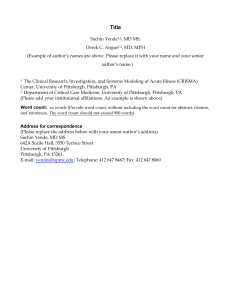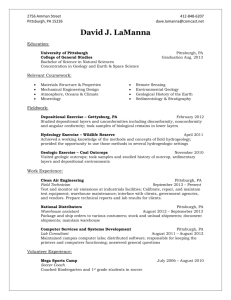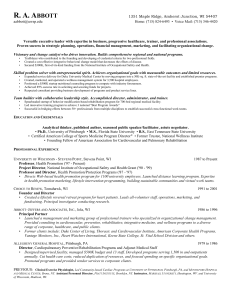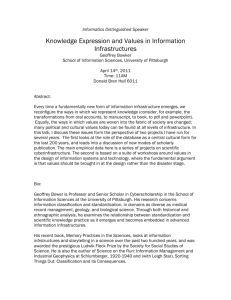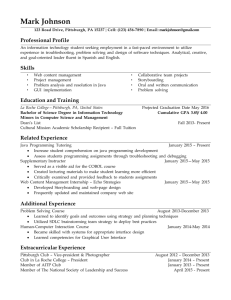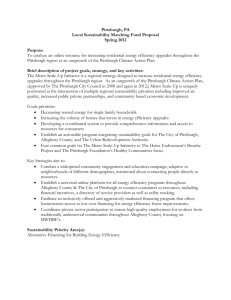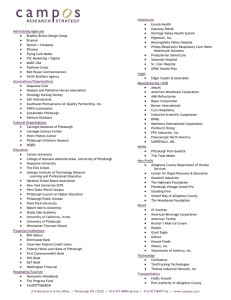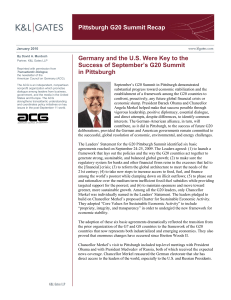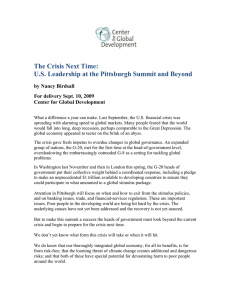DOC - Europa
advertisement
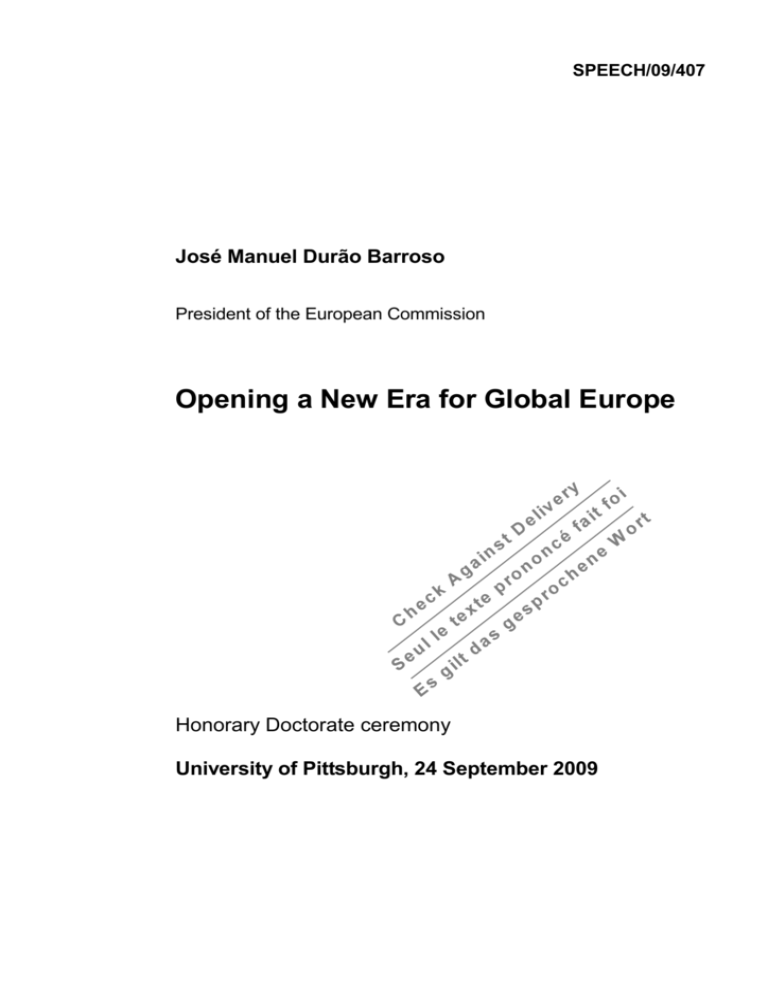
SPEECH/09/407 José Manuel Durão Barroso President of the European Commission Opening a New Era for Global Europe Honorary Doctorate ceremony University of Pittsburgh, 24 September 2009 Ladies and gentlemen, Let me start by thanking Chancellor Nordenberg and the University of Pittsburgh. I am deeply grateful to receive this honor from such a prestigious University. It is a real pleasure to be back in beautiful Pittsburgh after my last trip three years ago - but also very appropriate. I would like to talk today about the need to build more bridges between Europe and the United States. And where better to do that than in 'the City of Bridges' itself? President Obama wisely selected Pittsburgh as the host city for the G20 Summit. Those who subscribe to outdated views of your wonderful city may have been surprised by this decision. But I knew that Pittsburgh is an economic and civic success story that President Obama would wish to showcase for an international audience. Pittsburgh has been transformed by stressing the importance of new technologies, particularly information technology, medical research, biotechnology, nanotechnology and robotics. The University, led with great skill and vision by Chancellor Nordenberg, has played a vital role in that effort, positioning Pittsburgh to capitalize on the knowledge societies of the future. The European Commission recognized your success story at an early stage, even before Pittsburgh was voted America's most liveable city. In 1998, the University of Pittsburgh won a highly competitive award to found what is now the European Union Center of Excellence. The Director of the Center, Professor Alberta Sbragia, is one of the most respected scholars of the EU in the world. She has built a remarkable program that plays a leading role among the broader network of Centers of Excellence in the United States. Once again, thank you to the great University of Pittsburgh for this honour. Ladies and Gentlemen, The world we are living in is changing very fast. We are witnessing a transformation that goes far beyond the economic and financial crisis, and is leading towards a shift in the balance of world power. Europe in particular faces a tough choice during this period of transition and uncertainty: either grasp the opportunities of the world's increasing interdependence, or face a slow slide into strategic irrelevance. Despite the doom and gloom of the professional pessimists, I have every confidence that Europe will succeed in helping to shape globalisation. After all, the European Union has changed beyond recognition in recent years, and there are further transformations to come. Today, the EU is a stable and prosperous community of 27 democratic states committed to openness, freedom and human rights – just like the United States. Today, the EU brings together nearly half a billion people in the largest integrated economic area in the world, accounting for more than 30% of the world's GDP and 17% of trade. It also uses one the world's most important currencies – the euro. Today, the EU is engaging with its partners more than ever before. It shows solidarity with the developing world - by delivering more than 60% of world development aid. But it also shows a tough-minded attachment to peace and security - with more than 70,000 peacekeepers, police, magistrates and combat troops deployed in the world's hotspots. A new set of rules governing our actions - the Lisbon Treaty – will, if ratified over the next few months, give us the tools to open up a whole new era in the pursuit of European interests worldwide. 2 It will directly address some of the shortcomings that have held us back. It will help to improve the consistency of our external action. It will allow diplomacy, crisis management and an emerging European defence capability to be used alongside more traditional tools like trade and development. So Europe is re-positioning itself for the much more interdependent world that is emerging around us. For decades the European Union has been a laboratory for globalisation - before the word 'globalisation' even existed. It is by instinct comfortable with the multilateral approach that we will inevitably see more and more of, as the world struggles to find effective solutions to the new challenges of the 21st century. Challenges that have no respect for borders. Such as climate change. Such as pandemics. Such as international terrorism. Perhaps this is what Professor Tony Judt of New York University was getting at when he said: "The old continent's recovery had been a slow and uncertain process. In some ways it would never be complete: America would have the biggest army and China would make more, and cheaper, goods. But… In spite of the horrors of their recent past ― and in large measure because of them ― it was Europeans who were now uniquely placed to offer the world some modest advice on how to avoid repeating their own mistakes." Modest is the key word. I am not saying that the world needs Europe. But I am saying that we have something unique to offer. In short, we are determined to play a leadership role with our partners, shaping globalisation with those who share our values. And as we cast our eyes around the world at those who share our belief in freedom, in democracy, in respect for human rights and the rule of law, where do we look first? Right here, the United States. Only Europe and the US, with our global reach, our economic power and our shared values, have the critical mass to offer coherent and positive leadership for the world. And our citizens seem to agree. A regular poll by the German Marshall Fund shows there is a lot of scepticism towards globalisation, both in the US and in Europe. But when people on both sides of the Atlantic are asked where they place their trust to ensure that the global marketplace respects social and environmental standards, for example, the answer is clear. They look to the EU and the US, and their joint efforts to establish the necessary regulatory framework for the world economy. This is why [last September] I have called for a new 'Atlantic Agenda for Globalisation'. For a reinforced EU/US partnership based on a new agenda: By re-invigorating the Euro-American economic and political relationship; By making the EU-US relationship more outward-looking, and engaging more with third parties - including powers such as Brazil, Russia, India and China; By reforming the architecture of international co-operation; By joining our efforts to mitigate climate change while achieving greater energy security; 3 By defending and reinforcing an open, rules-based, multilateral trading system; By making further progress towards achieving the Millennium Development Goals; and By launching a comprehensive review of respective EU and US efforts to secure international peace and security. We want to engage the US in such an agenda, starting at the upcoming EU/US Summit in Washington in early November. This would send an important signal to the world that we are determined to reinforce the strategic effect of our partnership by reaching out to others, in search of new partnerships and new multilateral strategies. That we are determined to mould the structures of global governance together. In some ways, this reinvigorated Transatlantic partnership is beginning to take shape spontaneously, as the economic and financial crisis forces us all to step up the pace of global co-operation. A look back at the last few months shows that both sides have significantly raised the level of contacts, including at the highest level: President Obama and I have worked well together at several useful meetings this year: at the G20 Summit in London, the informal EU-US Summit in Prague, and the G8 Summit in Aquila. We will meet again now, here at the G20 Summit, and again at the EU-US Summit later this year. The Pittsburgh G20 summit will be pivotal in showing whether the international community can maintain the high levels of co-operation we have seen over the last 12 months, in order to get everyone back onto the path of economic recovery. Over the past year, we faced the test of an economic crisis which threatened to send our economies into freefall. And we took swift and effective action to avert that disaster. Together. Now we face a different test. Have we learnt the lessons of the past year? Are we ready to apply them to the phase of stabilisation, to develop the right exit strategies, and to find the sources of growth we need for the future? Now is not the time to be self-satisfied, or to assume that our task is to restore the status quo. Now is rather the time to recognise just how much things have changed and to begin to change our policies to fit with the post-crisis world. There are three key messages that I bring to Pittsburgh. - First, this is no time for complacency. The economic and financial situation is still fragile. We all face rising unemployment and the risk of social tension. We must keep our resolve, and carry through with the strategy that has served us well, and that seems to have averted the worst. So we need to keep support measures in place, but be ready with an exit strategy. Agreeing that we will prepare our exit strategies in a co-ordinated way will help confidence. Even if different countries exit at different times we need to have a coordinated approach which puts us back on track with sound public finances, and which gears us up to make the most of new sources of growth. - Second, we must keep up the pressure for reform of financial markets. Within Europe, the European Commission has put several proposals on the table, and will this week present formal legal proposals for a new supervisory architecture. We need to press on with action to ensure a healthy and successful financial sector in the future. That must include a strong push for coordinated and decisive international action on remuneration. 4 Finally, the evolution of the G20 itself is a remarkable testament to the recognition of the international community of our inter-dependence and the fact that we can achieve far more by acting together. We know this well in Europe – we must also keep up the momentum of the G20. For me, the most striking demonstration of this would be to secure a swift conclusion of the Doha round – not only to boost global trade, but also in recognition of our interest to help the developing world to pull out of the crisis as well. Ladies and gentlemen, Another reason I am in the United States was for the UN High Level Event on climate change – another area where our interdependence, and the need for joint action, is clear. This too was an important meeting – because its successful outcome has given a much-needed boost to the UN Climate Change Conference in Copenhagen in December. It is important that leaders engage and push the negotiators to find compromises and solutions. This spirit of engagement was strongly in evidence in NY and leaves me convinced that a deal can be reached in Copenhagen. What I said in New York was that we need a grand bargain: - First, to the developing world – if you are serious about the challenge of cutting emissions, we will be there to help, including with financial support. But we need developing countries to contribute to mitigation. In other words, no action, no money. - Second, to others in the developed world – as well as delivering on our binding mitigation targets, we need to make a credible financial commitment to the developing world. In other words, no money, no deal. - The Commission estimates that developing countries will need an additional 150 billion dollars a year by 2020. Although only 20 to 40 percent of this will come from international finance flows, the European Union must stand ready to pay its fair share. The coming months will be critical to Copenhagen's success. The time for playing high-stakes poker – and can the stakes get any higher than this? - is over. Now is the time for putting offers on the table – generous offers at the very limits of our political constraints. Everyone now needs to be as ambitious as they can be, as the UNFCCC negotiations proper resume in Bangkok next week. Ladies and gentlemen, Reform of financial markets and the fight against climate change are two of the key areas where the EU and the US can work more closely together. And I would encourage the United States to be even more ambitious in these areas. But there are plenty of others, like poverty, human rights, and energy security. So as a new era opens for a more global Europe, I say to the United States: in Europe you have a partner you can count on. Let's work together. Let's build even more bridges. Thank you. 5
